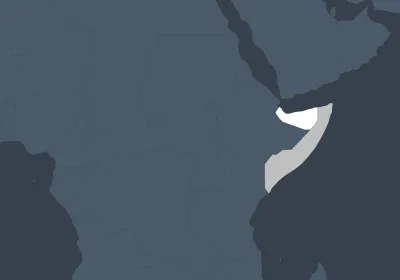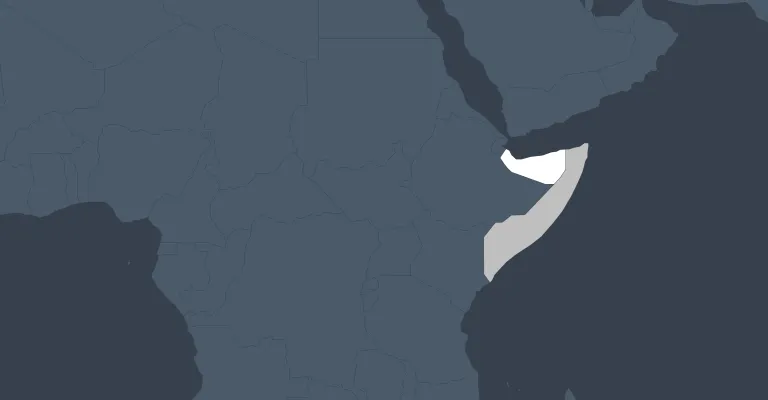
Somaliland*
| PR Political Rights | 21 40 |
| CL Civil Liberties | 26 60 |


Freedom in the World reports assess the level of political rights and civil liberties in a given geographical area, regardless of whether they are affected by the state, nonstate actors, or foreign powers. Related, disputed, and occupied territories are sometimes assessed separately if they meet certain criteria, including distinct conditions for political rights and civil liberties and boundaries that are sufficiently stable to allow year-on-year comparisons. For more information, see the report methodology and FAQ.
Somaliland—whose self-declared independence from Somalia is not internationally recognized—hosts a political system that has allowed democratic transfers of power between rival parties. However, elections have often been postponed, and civil liberties are subject to some restrictions. Journalists and other public figures have come under pressure from authorities. Minority clans are subject to political and economic marginalization, and violence against women remains a serious problem.
- Somaliland authorities attempted to suppress critical public discussion of a memorandum of understanding signed in January by Ethiopian and Somaliland diplomats, under which Somaliland could grant Ethiopia access to commercial and military port facilities in the Awdal region. That month, intelligence forces arrested MM Somali TV journalist Mohamed Abdi Sheikh Mohamed as he hosted a live debate on the agreement; three others were also detained but quickly released, and Mohamed was cleared by a court and released in February after more than 40 days in detention. In September, intelligence officers arrested Mohamed Abib, a member of the House of Representatives from Awdal, for allegedly criticizing the government in meetings with Somalian and Djiboutian officials. The House of Representatives objected to the arrest and declined to lift Abib’s immunity, and he was released after about 30 days under orders from the Supreme Court.
- A presidential election that was originally due in 2022 finally went forward in November, and Abdirahman Mohamed Abdullahi—also known as Irro—of the opposition party Waddani won with nearly 64 percent of the vote. Incumbent President Muse Bihi Abdi of the Kulmiye party placed second with 35 percent, followed by Faysal Ali Warabe of the opposition Justice and Welfare Party with about 1 percent. The election was competitive and resulted in a peaceful transfer of power after some 14 years of Kulmiye rule, but voting was not held in several conflict-affected districts in the east, disenfranchising some voters.
- Elections to determine which three parties would be officially recognized for the next 10 years were held concurrently with the presidential vote. The winners were Kulmiye, Waddani, and Kaah (Alliance for Equality and Development), while Justice and Welfare lost its status. Waddani and Kaah had notably formed a coalition in August to jointly support Irro in the presidential election.
- Dhulbahante clan militias maintained de facto control of territory centered on Las Anod in the eastern Sool region during the year, following 2023 clashes in which Somaliland government forces were driven out. The local Dhulbahante-led administration, which objected to the rule of Somaliland’s dominant Isaaq clans, sought to cultivate ties with the federal government of Somalia. Interclan tensions and the potential for violence in other regions persisted at year’s end.
This report has been abridged for Freedom in the World 2025 due to ongoing budget constraints. Freedom in the World is entirely funded by nongovernmental sources such as private foundations, corporations, and individuals like you. Please consider making a donation to support future editions of this vital resource.
For additional background information, see last year’s full report.
| Was the current head of government or other chief national authority elected through free and fair elections? | 3.003 4.004 |
Score Change: The score improved from 0 to 3 because a presidential election that was originally due in 2022 was conducted successfully during the year.
| Were the current national legislative representatives elected through free and fair elections? | 1.001 4.004 |
| Are the electoral laws and framework fair, and are they implemented impartially by the relevant election management bodies? | 2.002 4.004 |
| Do the people have the right to organize in different political parties or other competitive political groupings of their choice, and is the system free of undue obstacles to the rise and fall of these competing parties or groupings? | 3.003 4.004 |
| Is there a realistic opportunity for the opposition to increase its support or gain power through elections? | 3.003 4.004 |
| Are the people’s political choices free from domination by forces that are external to the political sphere, or by political forces that employ extrapolitical means? | 2.002 4.004 |
| Do various segments of the population (including ethnic, racial, religious, gender, LGBT+, and other relevant groups) have full political rights and electoral opportunities? | 2.002 4.004 |
| Do the freely elected head of government and national legislative representatives determine the policies of the government? | 2.002 4.004 |
Score Change: The score improved from 1 to 2 because the newly elected president assumed his post, replacing an incumbent who had exceeded his original mandate.
| Are safeguards against official corruption strong and effective? | 1.001 4.004 |
| Does the government operate with openness and transparency? | 2.002 4.004 |
| Are there free and independent media? | 2.002 4.004 |
| Are individuals free to practice and express their religious faith or nonbelief in public and private? | 2.002 4.004 |
| Is there academic freedom, and is the educational system free from extensive political indoctrination? | 2.002 4.004 |
| Are individuals free to express their personal views on political or other sensitive topics without fear of surveillance or retribution? | 2.002 4.004 |
| Is there freedom of assembly? | 1.001 4.004 |
| Is there freedom for nongovernmental organizations, particularly those that are engaged in human rights– and governance-related work? | 2.002 4.004 |
| Is there freedom for trade unions and similar professional or labor organizations? | 2.002 4.004 |
| Is there an independent judiciary? | 2.002 4.004 |
| Does due process prevail in civil and criminal matters? | 2.002 4.004 |
| Is there protection from the illegitimate use of physical force and freedom from war and insurgencies? | 1.001 4.004 |
| Do laws, policies, and practices guarantee equal treatment of various segments of the population? | 2.002 4.004 |
| Do individuals enjoy freedom of movement, including the ability to change their place of residence, employment, or education? | 2.002 4.004 |
| Are individuals able to exercise the right to own property and establish private businesses without undue interference from state or nonstate actors? | 2.002 4.004 |
| Do individuals enjoy personal social freedoms, including choice of marriage partner and size of family, protection from domestic violence, and control over appearance? | 1.001 4.004 |
| Do individuals enjoy equality of opportunity and freedom from economic exploitation? | 1.001 4.004 |
Country Facts
-
Global Freedom Score
47 100 partly free
